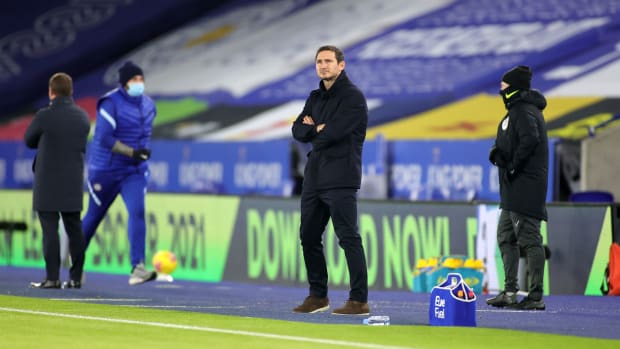The pressure is as high as it's been on Frank Lampard, with the Chelsea legend overseeing another familiar-looking loss to another top side.
For Frank Lampard, the clock is ticking. Leicester City went top of the Premier League with a 2-0 win over his Chelsea side on Tuesday, but at least as significant as that is that halfway through the season, Chelsea is now nine points off the top (and potentially 12 if Manchester City wins its two games in hand), having lost five of its last eight in the league.
In truth, this was a straightforward Leicester win, one that exposed the Chelsea flaws that have come to seem very familiar. There are moments of individual quality from Chelsea, but little in the way of coherence. Six games against the other members of the Big Six plus Leicester, the sides likely to comprise the top third of the table, have yielded just two points. Lampard may speak of fine margins going against him, but that is a clear pattern.
There was a 17-game unbeaten run from mid-September to mid-December, but that was a little misleading. Those fixtures fell into one of two categories: either games against weaker opponents in which Chelsea’s weight of talent won out, or games against stronger opponents in which Chelsea could sit deep and take a goalless draw. The tougher matches for coaches are those against upper-mid-table sides Chelsea would expect to beat but who still offer a threat.
The fixture list threw up five of those in a row and, although Chelsea beat West Ham, not quite as comfortably as the 3-0 scoreline might suggest, it drew against Aston Villa and lost to Everton, Wolves and Arsenal. In the Arsenal game, in particular, Chelsea was poor. Lampard blamed the mentality of his players, but the issue was at least in part tactical, as Chelsea failed to deal with Arsenal’s threat from wide areas.

The subsequent defeat to Manchester City could in part be put down to the excellence of Pep Guardiola’s side, but that in itself is a concern. After a $300 million expenditure in the summer, Chelsea’s board could be forgiven for thinking the gulf between Chelsea and the very best in England should not be so vast.
The biggest of those signings are yet really to fire. Kai Havertz, signed for $97 million from Bayer Leverkusen, has not settled at all. He is only 21 and the usual problems of adapting to a new country have been compounded by him contracting COVID-19. It hasn’t helped, though, that in his first 10 Premier League starts, he played in five different roles. There is no sense that Lampard has a clear picture of how he wants to deploy him.
Similarly, Timo Werner, who cost $65 million, has not played in the role he did at RB Leipzig. He’s started on the left and in the middle, sometimes in a 4-3-3, sometimes a 3-4-3 and sometimes a 4-2-3-1. He hasn’t looked comfortable in any of them and has scored just four goals. Halfway through the season, there is very little evidence Lampard knows how to use all his new toys.
That is compounding problems that were there last season. Since Lampard arrived at Chelsea, only Newcastle has let in more goals away from home than Chelsea. Breakaways and crossed set plays have been a major problem, and it was a corner that allowed Leicester to open the scoring Tuesday, with Wilfred Ndidi lashing in a cut-back from just outside the box.
It’s not just that the defending has been chaotic, it’s that defenders seem actively to get worse under Lampard. Marcos Alonso and David Luiz were both frozen out last season as their form disintegrated. Goalkeeper Kepa Arrizabalaga may as well have been a hologram by the time he was eventually replaced, but Edouard Mendy, after a promising start, has begun to look fallible. The defending for Leicester’s second goal was appalling. Antonio Rudiger, who had looked on the way out from the club, failed to deal with Jamie Vardy and so missed a simple through ball that fell for James Maddison, who had wandered away from Reece James, to score.
Lampard as a club legend has perhaps been treated with more patience than others would have been. Since Roman Abramovich took over the club in 2003, every manager who has been in charge for a full season and failed to win the league has been sacked, with the exception of Jose Mourinho in his first spell–and even he lasted only until September of the following campaign. The 2019 transfer ban perhaps offered some mitigation, but after the expenditure last summer, the lack of evident progress must be a major concern.
That there have been discussions about possible successors among the Chelsea hierarchy is no secret. Perhaps there is still a belief that Chelsea could finish in the top four, but there must also be a thought that a new manager could at least have a run at the Champions League–just as Roberto Di Matteo did after replacing Andre Villas-Boas in 2012. Chelsea faces Atletico Madrid in the last 16 with the first leg on February 23. History, though, suggests that once a manager has entered a downward spiral at Chelsea, it is very hard to arrest. Each fixture now comes loaded with menace.